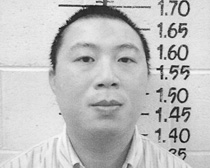Man convicted for role in international counterfeit drug distribution scheme
LOS ANGELES — A Puerto Rican man faces up to 10 years in prison after being found guilty by a jury this week on federal charges stemming from his role as a key operative for a drug ring that distributed large quantities of Chinese-made counterfeit pharmaceuticals throughout the United States and worldwide.
Francis Ortiz Gonzalez, 36, was convicted following a six-day trial on one count of conspiracy and seven counts of trafficking in counterfeit pharmaceuticals. His sentencing is set for Nov. 8 before U.S. District Judge George Wu. Ortiz-Gonzalez. His wife, Ideliz Aleman-Valentin, and two other defendants were named in a 30-count indictment handed down by a grand jury in Los Angeles in June 2009. The jury that convicted Ortiz acquitted Aleman-Valentin.
In 2009, special agents with U.S. Immigration and Customs Enforcement's (ICE) Homeland Security Investigations (HSI) executed a federal search warrant at Ortiz-Gonzalez's residence in Trujillo Alto, Puerto Rico, a suburb of San Juan. Inside the home, investigators found more than 100,000 pills made to resemble a variety of popular prescription medications, including Viagra, Cialis, Valium, Xanax and Lipitor. The ensuing investigation revealed that Ortiz-Gonzalez had packaged and shipped more than 160,000 counterfeit tablets during a six-month period in 2009 while working for the organization. Many of those shipments were mailed to Southern California, which is why the case was brought to Los Angeles.
The burgeoning popularity of e-commerce has led to an explosion in the number of websites offering prescription drugs online," said Claude Arnold, special agent in charge for HSI Los Angeles. "But consumers who are considering purchasing pharmaceutical products over the Internet should heed that old expression 'buyer beware.' Part of what you're paying for when you buy established brands, regardless of the product, is quality control. Imposter drugs like these pose a serious threat to users who mistakenly assume these substances are safe."
The indictment allege that Ortiz-Gonzalez acted as U.S.-based distributor for a criminal enterprise, allegedly headed by Bo Jiang, 34, a Chinese national whose last known residence is New Zealand. In January 2011, Jiang was taken into custody on a provisional arrest warrant by authorities in New Zealand, but fled shortly after being released on bond. He remains a fugitive.
According to the indictment, Jiang advertised the counterfeit medications over the Internet. As part of the scheme, he allegedly recruited individuals from around the world to act as distributors for the products. The U.S.-based distributors, including Ortiz-Gonzalez, were responsible for receiving the parcels of counterfeit pharmaceuticals from China, then repacking and shipping them to fill individual customer's orders throughout the United States.
The probe, which commenced in 2008, involved HIS Los Angeles, the Food and Drug Administration, Office of Criminal Investigations and the U.S. Postal Inspection Service.
The Department of Homeland Security and the Department of Justice are working together to combat intellectual property crimes. In fiscal year 2011, HSI and U.S. Customs and Border Protection made nearly 25,000 seizures involving counterfeited and pirated products, a 24 percent increase compared to fiscal year 2010.
As the largest investigative arm of the Department of Homeland Security, HSI plays a leading role in targeting criminal organizations responsible for producing, smuggling and distributing counterfeit products. HSI focuses not only on keeping counterfeit products off our streets, but also on dismantling the criminal organizations behind such illicit activity.


